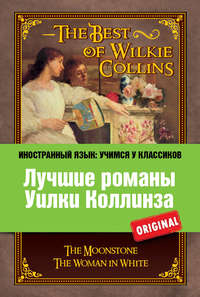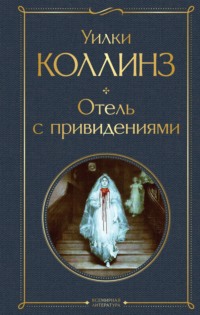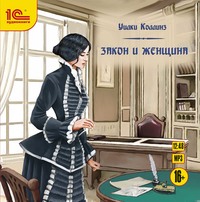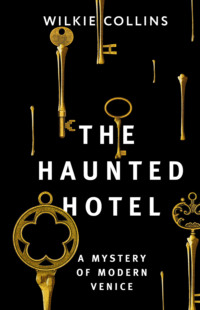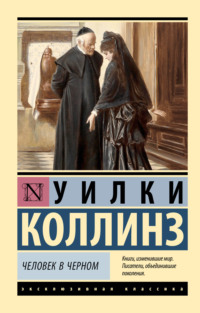
Полная версия
Man and Wife
"Follow you?" interposed Geoffrey. "Where?" She drew her chair nearer to him, and whispered the next words in his ear.
"To a lonely little mountain inn—four miles from this."
"An inn!"
"Why not?"
"An inn is a public place."
A movement of natural impatience escaped her—but she controlled herself, and went on as quietly as before:
"The place I mean is the loneliest place in the neighborhood. You have no prying eyes to dread there. I have picked it out expressly for that reason. It's away from the railway; it's away from the high-road: it's kept by a decent, respectable Scotchwoman—"
"Decent, respectable Scotchwomen who keep inns," interposed Geoffrey, "don't cotton to young ladies who are traveling alone. The landlady won't receive you."
It was a well-aimed objection—but it missed the mark. A woman bent on her marriage is a woman who can meet the objections of the whole world, single-handed, and refute them all.
"I have provided for every thing," she said, "and I have provided for that. I shall tell the landlady I am on my wedding-trip. I shall say my husband is sight-seeing, on foot, among the mountains in the neighborhood—"
"She is sure to believe that!" said Geoffrey.
"She is sure to disbelieve it, if you like. Let her! You have only to appear, and to ask for your wife—and there is my story proved to be true! She may be the most suspicious woman living, as long as I am alone with her. The moment you join me, you set her suspicions at rest. Leave me to do my part. My part is the hard one. Will you do yours?"
It was impossible to say No: she had fairly cut the ground from under his feet. He shifted his ground. Any thing rather than say Yes!
"I suppose you know how we are to be married?" he asked. "All I can say is—I don't."
"You do!" she retorted. "You know that we are in Scotland. You know that there are neither forms, ceremonies, nor delays in marriage, here. The plan I have proposed to you secures my being received at the inn, and makes it easy and natural for you to join me there afterward. The rest is in our own hands. A man and a woman who wish to be married (in Scotland) have only to secure the necessary witnesses and the thing is done. If the landlady chooses to resent the deception practiced on her, after that, the landlady may do as she pleases. We shall have gained our object in spite of her—and, what is more, we shall have gained it without risk to you."
"Don't lay it all on my shoulders," Geoffrey rejoined. "You women go headlong at every thing. Say we are married. We must separate afterward—or how are we to keep it a secret?"
"Certainly. You will go back, of course, to your brother's house, as if nothing had happened."
"And what is to become of you?"
"I shall go to London."
"What are you to do in London?"
"Haven't I already told you that I have thought of every thing? When I get to London I shall apply to some of my mother's old friends—friends of hers in the time when she was a musician. Every body tells me I have a voice—if I had only cultivated it. I will cultivate it! I can live, and live respectably, as a concert singer. I have saved money enough to support me, while I am learning—and my mother's friends will help me, for her sake."
So, in the new life that she was marking out, was she now unconsciously reflecting in herself the life of her mother before her. Here was the mother's career as a public singer, chosen (in spite of all efforts to prevent it) by the child! Here (though with other motives, and under other circumstances) was the mother's irregular marriage in Ireland, on the point of being followed by the daughter's irregular marriage in Scotland! And here, stranger still, was the man who was answerable for it—the son of the man who had found the flaw in the Irish marriage, and had shown the way by which her mother was thrown on the world! "My Anne is my second self. She is not called by her father's name; she is called by mine. She is Anne Silvester as I was. Will she end like Me?"—The answer to those words—the last words that had trembled on the dying mother's lips—was coming fast. Through the chances and changes of many years, the future was pressing near—and Anne Silvester stood on the brink of it.
"Well?" she resumed. "Are you at the end of your objections? Can you give me a plain answer at last?"
No! He had another objection ready as the words passed her lips.
"Suppose the witnesses at the inn happen to know me?" he said. "Suppose it comes to my father's ears in that way?"
"Suppose you drive me to my death?" she retorted, starting to her feet. "Your father shall know the truth, in that case—I swear it!"
He rose, on his side, and drew back from her. She followed him up. There was a clapping of hands, at the same moment, on the lawn. Somebody had evidently made a brilliant stroke which promised to decide the game. There was no security now that Blanche might not return again. There was every prospect, the game being over, that Lady Lundie would be free. Anne brought the interview to its crisis, without wasting a moment more.
"Mr. Geoffrey Delamayn," she said. "You have bargained for a private marriage, and I have consented. Are you, or are you not, ready to marry me on your own terms?"
"Give me a minute to think!"
"Not an instant. Once for all, is it Yes, or No?"
He couldn't say "Yes," even then. But he said what was equivalent to it. He asked, savagely, "Where is the inn?"
She put her arm in his, and whispered, rapidly, "Pass the road on the right that leads to the railway. Follow the path over the moor, and the sheep-track up the hill. The first house you come to after that is the inn. You understand!"
He nodded his head, with a sullen frown, and took his pipe out of his pocket again.
"Let it alone this time," he said, meeting her eye. "My mind's upset. When a man's mind's upset, a man can't smoke. What's the name of the place?"
"Craig Fernie."
"Who am I to ask for at the door?"
"For your wife."
"Suppose they want you to give your name when you get there?"
"If I must give a name, I shall call myself Mrs., instead of Miss, Silvester. But I shall do my best to avoid giving any name. And you will do your best to avoid making a mistake, by only asking for me as your wife. Is there any thing else you want to know?"
"Yes."
"Be quick about it! What is it?"
"How am I to know you have got away from here?"
"If you don't hear from me in half an hour from the time when I have left you, you may be sure I have got away. Hush!"
Two voices, in conversation, were audible at the bottom of the steps—Lady Lundie's voice and Sir Patrick's. Anne pointed to the door in the back wall of the summer-house. She had just pulled it to again, after Geoffrey had passed through it, when Lady Lundie and Sir Patrick appeared at the top of the steps.
CHAPTER THE SIXTH.
THE SUITOR.
LADY LUNDIE pointed significantly to the door, and addressed herself to Sir Patrick's private ear.
"Observe!" she said. "Miss Silvester has just got rid of somebody."
Sir Patrick deliberately looked in the wrong direction, and (in the politest possible manner) observed—nothing.
Lady Lundie advanced into the summer-house. Suspicious hatred of the governess was written legibly in every line of her face. Suspicious distrust of the governess's illness spoke plainly in every tone of her voice.
"May I inquire, Miss Silvester, if your sufferings are relieved?"
"I am no better, Lady Lundie."
"I beg your pardon?"
"I said I was no better."
"You appear to be able to stand up. When I am ill, I am not so fortunate. I am obliged to lie down."'
"I will follow your example, Lady Lundie. If you will be so good as to excuse me, I will leave you, and lie down in my own room."
She could say no more. The interview with Geoffrey had worn her out; there was no spirit left in her to resist the petty malice of the woman, after bearing, as she had borne it, the brutish indifference of the man. In another moment the hysterical suffering which she was keeping down would have forced its way outward in tears. Without waiting to know whether she was excused or not, without stopping to hear a word more, she left the summer-house.
Lady Lundie's magnificent black eyes opened to their utmost width, and blazed with their most dazzling brightness. She appealed to Sir Patrick, poised easily on his ivory cane, and looking out at the lawn-party, the picture of venerable innocence.
"After what I have already told you, Sir Patrick, of Miss Silvester's conduct, may I ask whether you consider that proceeding at all extraordinary?"
The old gentleman touched the spring in the knob of his cane, and answered, in the courtly manner of the old school:
"I consider no proceeding extraordinary Lady Lundie, which emanates from your enchanting sex."
He bowed, and took his pinch. With a little jaunty flourish of the hand, he dusted the stray grains of snuff off his finger and thumb, and looked back again at the lawn-party, and became more absorbed in the diversions of his young friends than ever.
Lady Lundie stood her ground, plainly determined to force a serious expression of opinion from her brother-in-law. Before she could speak again, Arnold and Blanche appeared together at the bottom of the steps. "And when does the dancing begin?" inquired Sir Patrick, advancing to meet them, and looking as if he felt the deepest interest in a speedy settlement of the question.
"The very thing I was going to ask mamma," returned Blanche. "Is she in there with Anne? Is Anne better?"
Lady Lundie forthwith appeared, and took the answer to that inquiry on herself.
"Miss Silvester has retired to her room. Miss Silvester persists in being ill. Have you noticed, Sir Patrick, that these half-bred sort of people are almost invariably rude when they are ill?"
Blanche's bright face flushed up. "If you think Anne a half-bred person, Lady Lundie, you stand alone in your opinion. My uncle doesn't agree with you, I'm sure."
Sir Patrick's interest in the first quadrille became almost painful to see. "Do tell me, my dear, when is the dancing going to begin?"
"The sooner the better," interposed Lady Lundie; "before Blanche picks another quarrel with me on the subject of Miss Silvester."
Blanche looked at her uncle. "Begin! begin! Don't lose time!" cried the ardent Sir Patrick, pointing toward the house with his cane. "Certainly, uncle! Any thing that you wish!" With that parting shot at her step-mother, Blanche withdrew. Arnold, who had thus far waited in silence at the foot of the steps, looked appealingly at Sir Patrick. The train which was to take him to his newly inherited property would start in less than an hour; and he had not presented himself to Blanche's guardian in the character of Blanche's suitor yet! Sir Patrick's indifference to all domestic claims on him—claims of persons who loved, and claims of persons who hated, it didn't matter which—remained perfectly unassailable. There he stood, poised on his cane, humming an old Scotch air. And there was Lady Lundie, resolute not to leave him till he had seen the governess with her eyes and judged the governess with her mind. She returned to the charge—in spite of Sir Patrick, humming at the top of the steps, and of Arnold, waiting at the bottom. (Her enemies said, "No wonder poor Sir Thomas died in a few months after his marriage!" And, oh dear me, our enemies are sometimes right!)
"I must once more remind you, Sir Patrick, that I have serious reason to doubt whether Miss Silvester is a fit companion for Blanche. My governess has something on her mind. She has fits of crying in private. She is up and walking about her room when she ought to be asleep. She posts her own letters—and, she has lately been excessively insolent to Me. There is something wrong. I must take some steps in the matter—and it is only proper that I should do so with your sanction, as head of the family."
"Consider me as abdicating my position, Lady Lundie, in your favor."
"Sir Patrick, I beg you to observe that I am speaking seriously, and that I expect a serious reply."
"My good lady, ask me for any thing else and it is at your service. I have not made a serious reply since I gave up practice at the Scottish Bar. At my age," added Sir Patrick, cunningly drifting into generalities, "nothing is serious—except Indigestion. I say, with the philosopher, 'Life is a comedy to those who think, and tragedy to those who feel.'" He took his sister-in-law's hand, and kissed it. "Dear Lady Lundie, why feel?"
Lady Lundie, who had never "felt" in her life, appeared perversely determined to feel, on this occasion. She was offended—and she showed it plainly.
"When you are next called on, Sir Patrick, to judge of Miss Silvester's conduct," she said, "unless I am entirely mistaken, you will find yourself compelled to consider it as something beyond a joke." With those words, she walked out of the summer-house—and so forwarded Arnold's interests by leaving Blanche's guardian alone at last.
It was an excellent opportunity. The guests were safe in the house—there was no interruption to be feared, Arnold showed himself. Sir Patrick (perfectly undisturbed by Lady Lundie's parting speech) sat down in the summer-house, without noticing his young friend, and asked himself a question founded on profound observation of the female sex. "Were there ever two women yet with a quarrel between them," thought the old gentleman, "who didn't want to drag a man into it? Let them drag me in, if they can!"
Arnold advanced a step, and modestly announced himself. "I hope I am not in the way, Sir Patrick?"
"In the way? of course not! Bless my soul, how serious the boy looks! Are you going to appeal to me as the head of the family next?"
It was exactly what Arnold was about to do. But it was plain that if he admitted it just then Sir Patrick (for some unintelligible reason) would decline to listen to him. He answered cautiously, "I asked leave to consult you in private, Sir; and you kindly said you would give me the opportunity before I left Windygates?"
"Ay! ay! to be sure. I remember. We were both engaged in the serious business of croquet at the time—and it was doubtful which of us did that business most clumsily. Well, here is the opportunity; and here am I, with all my worldly experience, at your service. I have only one caution to give you. Don't appeal to me as 'the head of the family.' My resignation is in Lady Lundie's hands."
He was, as usual, half in jest, half in earnest. The wry twist of humor showed itself at the corners of his lips. Arnold was at a loss how to approach Sir Patrick on the subject of his niece without reminding him of his domestic responsibilities on the one hand, and without setting himself up as a target for the shafts of Sir Patrick's wit on the other. In this difficulty, he committed a mistake at the outset. He hesitated.
"Don't hurry yourself," said Sir Patrick. "Collect your ideas. I can wait! I can wait!"
Arnold collected his ideas—and committed a second mistake. He determined on feeling his way cautiously at first. Under the circumstances (and with such a man as he had now to deal with), it was perhaps the rashest resolution at which he could possibly have arrived—it was the mouse attempting to outmanoeuvre the cat.
"You have been very kind, Sir, in offering me the benefit of your experience," he began. "I want a word of advice."
"Suppose you take it sitting?" suggested Sir Patrick. "Get a chair." His sharp eyes followed Arnold with an expression of malicious enjoyment. "Wants my advice?" he thought. "The young humbug wants nothing of the sort—he wants my niece."
Arnold sat down under Sir Patrick's eye, with a well-founded suspicion that he was destined to suffer, before he got up again, under Sir Patrick's tongue.
"I am only a young man," he went on, moving uneasily in his chair, "and I am beginning a new life—"
"Any thing wrong with the chair?" asked Sir Patrick. "Begin your new life comfortably, and get another."
"There's nothing wrong with the chair, Sir. Would you—"
"Would I keep the chair, in that case? Certainly."
"I mean, would you advise me—"
"My good fellow, I'm waiting to advise you. (I'm sure there's something wrong with that chair. Why be obstinate about it? Why not get another?)"
"Please don't notice the chair, Sir Patrick—you put me out. I want—in short—perhaps it's a curious question—"
"I can't say till I have heard it," remarked Sir Patrick. "However, we will admit it, for form's sake, if you like. Say it's a curious question. Or let us express it more strongly, if that will help you. Say it's the most extraordinary question that ever was put, since the beginning of the world, from one human being to another."
"It's this!" Arnold burst out, desperately. "I want to be married!"
"That isn't a question," objected Sir Patrick. "It's an assertion. You say, I want to be married. And I say, Just so! And there's an end of it."
Arnold's head began to whirl. "Would you advise me to get married, Sir?" he said, piteously. "That's what I meant."
"Oh! That's the object of the present interview, is it? Would I advise you to marry, eh?"
(Having caught the mouse by this time, the cat lifted his paw and let the luckless little creature breathe again. Sir Patrick's manner suddenly freed itself from any slight signs of impatience which it might have hitherto shown, and became as pleasantly easy and confidential as a manner could be. He touched the knob of his cane, and helped himself, with infinite zest and enjoyment, to a pinch of snuff.)
"Would I advise you to marry?" repeated Sir Patrick. "Two courses are open to us, Mr. Arnold, in treating that question. We may put it briefly, or we may put it at great length. I am for putting it briefly. What do you say?"
"What you say, Sir Patrick."
"Very good. May I begin by making an inquiry relating to your past life?"
"Certainly!"
"Very good again. When you were in the merchant service, did you ever have any experience in buying provisions ashore?"
Arnold stared. If any relation existed between that question and the subject in hand it was an impenetrable relation to him. He answered, in unconcealed bewilderment, "Plenty of experience, Sir."
"I'm coming to the point," pursued Sir Patrick. "Don't be astonished. I'm coming to the point. What did you think of your moist sugar when you bought it at the grocer's?"
"Think?" repeated Arnold. "Why, I thought it was moist sugar, to be sure!"
"Marry, by all means!" cried Sir Patrick. "You are one of the few men who can try that experiment with a fair chance of success."
The suddenness of the answer fairly took away Arnold's breath. There was something perfectly electric in the brevity of his venerable friend. He stared harder than ever.
"Don't you understand me?" asked Sir Patrick.
"I don't understand what the moist sugar has got to do with it, Sir."
"You don't see that?"
"Not a bit!"
"Then I'll show you," said Sir Patrick, crossing his legs, and setting in comfortably for a good talk "You go to the tea-shop, and get your moist sugar. You take it on the understanding that it is moist sugar. But it isn't any thing of the sort. It's a compound of adulterations made up to look like sugar. You shut your eyes to that awkward fact, and swallow your adulterated mess in various articles of food; and you and your sugar get on together in that way as well as you can. Do you follow me, so far?"
Yes. Arnold (quite in the dark) followed, so far.
"Very good," pursued Sir Patrick. "You go to the marriage-shop, and get a wife. You take her on the understanding—let us say—that she has lovely yellow hair, that she has an exquisite complexion, that her figure is the perfection of plumpness, and that she is just tall enough to carry the plumpness off. You bring her home, and you discover that it's the old story of the sugar over again. Your wife is an adulterated article. Her lovely yellow hair is—dye. Her exquisite skin is—pearl powder. Her plumpness is—padding. And three inches of her height are—in the boot-maker's heels. Shut your eyes, and swallow your adulterated wife as you swallow your adulterated sugar—and, I tell you again, you are one of the few men who can try the marriage experiment with a fair chance of success."
With that he uncrossed his legs again, and looked hard at Arnold. Arnold read the lesson, at last, in the right way. He gave up the hopeless attempt to circumvent Sir Patrick, and—come what might of it—dashed at a direct allusion to Sir Patrick's niece.
"That may be all very true, Sir, of some young ladies," he said. "There is one I know of, who is nearly related to you, and who doesn't deserve what you have said of the rest of them."
This was coming to the point. Sir Patrick showed his approval of Arnold's frankness by coming to the point himself, as readily as his own whimsical humor would let him.
"Is this female phenomenon my niece?" he inquired.
"Yes, Sir Patrick."
"May I ask how you know that my niece is not an adulterated article, like the rest of them?"
Arnold's indignation loosened the last restraints that tied Arnold's tongue. He exploded in the three words which mean three volumes in every circulating library in the kingdom.
"I love her."
Sir Patrick sat back in his chair, and stretched out his legs luxuriously.
"That's the most convincing answer I ever heard in my life," he said.
"I'm in earnest!" cried Arnold, reckless by this time of every consideration but one. "Put me to the test, Sir! put me to the test!"
"Oh, very well. The test is easily put." He looked at Arnold, with the irrepressible humor twinkling merrily in his eyes, and twitching sharply at the corners of his lips. "My niece has a beautiful complexion. Do you believe in her complexion?"
"There's a beautiful sky above our heads," returned Arnold. "I believe in the sky."
"Do you?" retorted Sir Patrick. "You were evidently never caught in a shower. My niece has an immense quantity of hair. Are you convinced that it all grows on her head?"
"I defy any other woman's head to produce the like of it!"
"My dear Arnold, you greatly underrate the existing resources of the trade in hair! Look into the shop-windows. When you next go to London pray look into the show-windows. In the mean time, what do you think of my niece's figure?"
"Oh, come! there can't be any doubt about that! Any man, with eyes in his head, can see it's the loveliest figure in the world."
Sir Patrick laughed softly, and crossed his legs again.
"My good fellow, of course it is! The loveliest figure in the world is the commonest thing in the world. At a rough guess, there are forty ladies at this lawn-party. Every one of them possesses a beautiful figure. It varies in price; and when it's particularly seductive you may swear it comes from Paris. Why, how you stare! When I asked you what you thought of my niece's figure, I meant—how much of it comes from Nature, and how much of it comes from the Shop? I don't know, mind! Do you?"
"I'll take my oath to every inch of it!"
"Shop?"
"Nature!"
Sir Patrick rose to his feet; his satirical humor was silenced at last.
"If ever I have a son," he thought to himself, "that son shall go to sea!" He took Arnold's arm, as a preliminary to putting an end to Arnold's suspense. "If I can be serious about any thing," he resumed, "it's time to be serious with you. I am convinced of the sincerity of your attachment. All I know of you is in your favor, and your birth and position are beyond dispute. If you have Blanche's consent, you have mine." Arnold attempted to express his gratitude. Sir Patrick, declining to hear him, went on. "And remember this, in the future. When you next want any thing that I can give you, ask for it plainly. Don't attempt to mystify me on the next occasion, and I will promise, on my side, not to mystify you. There, that's understood. Now about this journey of yours to see your estate. Property has its duties, Master Arnold, as well as its rights. The time is fast coming when its rights will be disputed, if its duties are not performed. I have got a new interest in you, and I mean to see that you do your duty. It's settled you are to leave Windygates to-day. Is it arranged how you are to go?"


